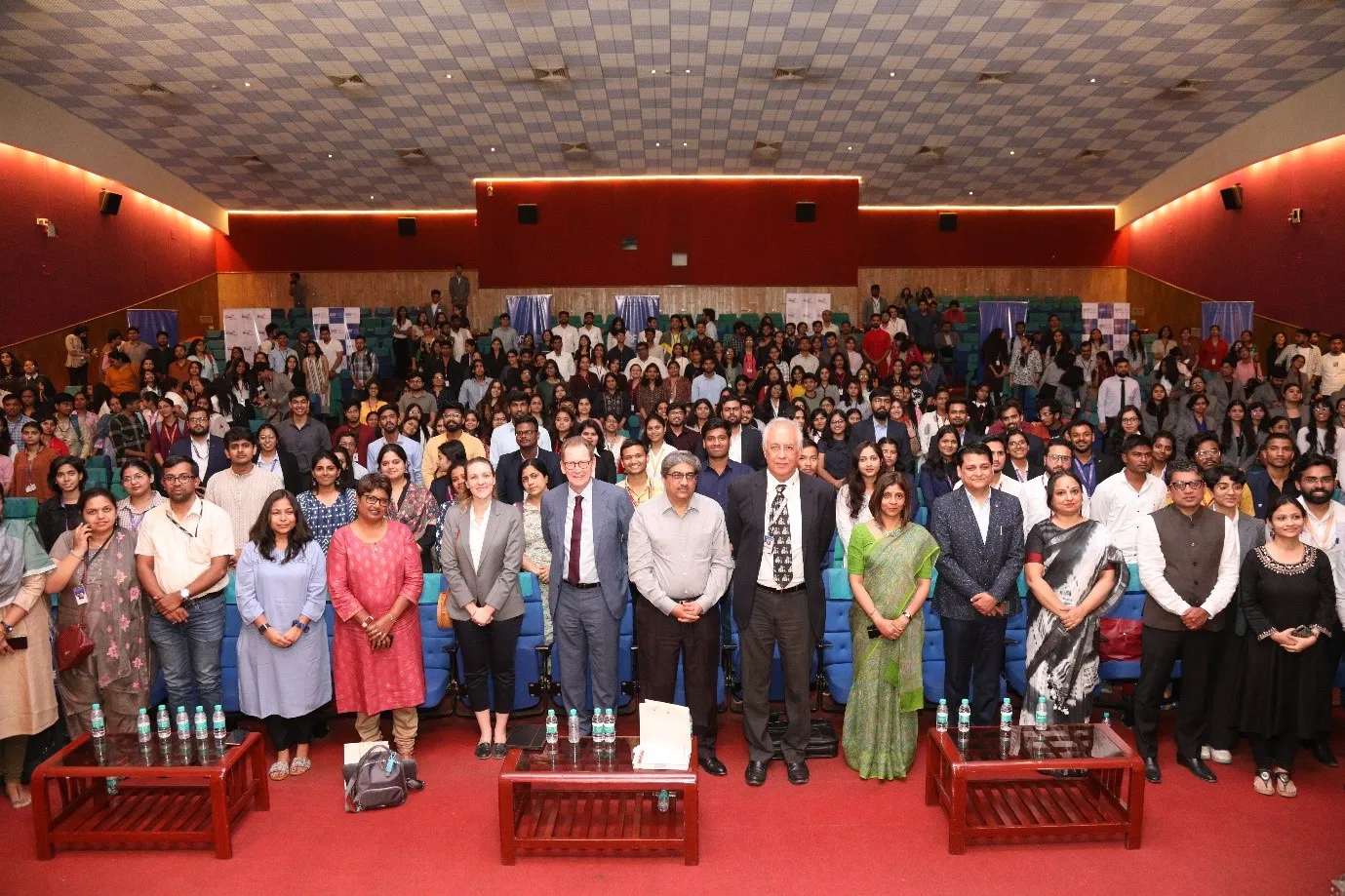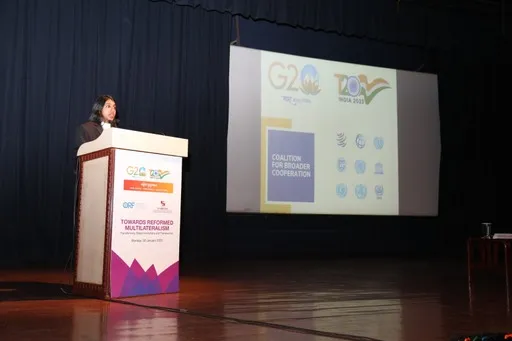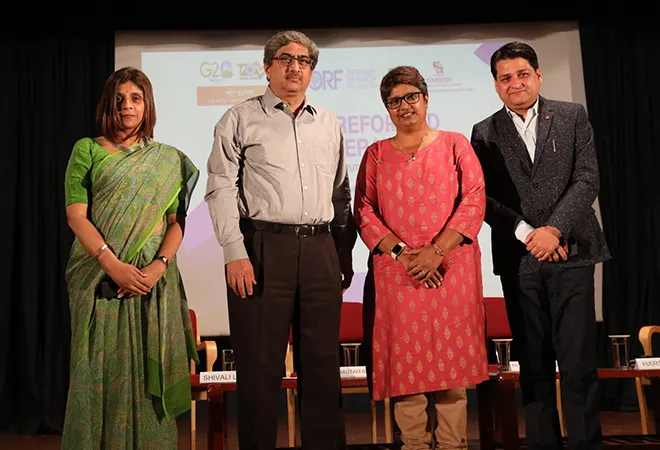On January 30, the Observer Research Foundation (ORF), in partnership with the Symbiosis School of International Studies in Pune, hosted a Think20 side event on ‘Towards Reformed Multilateralism: Transforming global institutions and frameworks.’
The panel comprised of four leading experts in the field of international relations and geopolitics, including Amb. Gautam Bambawale, former Ambassador to China and Bhutan and High Commissioner to Pakistan; Dr. Rajeswari Pillai Rajagopalan, Director of Centre for Security, Strategy and Technology, ORF; Prof. Harsh V. Pant, Vice President of Studies and Foreign Policy, ORF; and Shivali Lawale, Director of Symbiosis School of International Studies, Pune.
The T20 side event took off with a brief explanation of the current dynamics within multilateral institutions concerning veto power. The discussion explored challenges and opportunities for transforming global institutions and frameworks, particularly emphasising the role of India and how it can make an effective contribution under the ongoing G20 Presidency.
Sharing their thoughts on the urgency for reforms, the panellists explained India's stand towards reforming international organisations, such as the United Nations, World Trade Organization, World Health Organization, and the International Monetary Fund. Amb. Bambawale discussed how these organisations and institutions are underrepresenting the current state of world affairs and undermining the stand of developing nations. Multilateral organisations today are unable to function as they once did since they continue to live in the realities of 1945, he argued.
Dr. Rajagopalan stressed the importance of inclusive decision-making processes in global institutions and the need to ensure that all countries, regardless of their size and power, have a say in shaping the world's future. She addressed the ineffective nature of such institutions, given the global power shifts observed in current times.
Prof. Pant drew attention to the role of different actors, including governments, civil society, and the private sector, in implementing reforms and framing narratives to find India's stand in the current dynamics of multilateral organisations. He deliberated upon the potential impact of technological advancements, such as artificial intelligence (AI), on multilateralism and international institutions. He made intriguing statements towards the change in the narrative since the Cold War and how the perceptions held by the powers of that era could no longer determine the type of power dynamics confronting the emerging world order.
The discussion also covered India's current standing amid all balance-of-power debates, explaining the critical role of India’s G20 Presidency in inciting debates on finding our way through such pressing problems. Amb. Bambawale emphasised the need for strengthening the capacity of international organisations to effectively address any current and future global challenges, especially with regards to India being the fifth largest economy which could do with better representation amongst the global fora.

The panel discussion was followed by student presentations from ten educational institutions from Pune on Reformed Multilateralism. They included Gokhale Institute of Politics and Economics, Institute of Management Development and Research (IMDR), FLAME University, Symbiosis College of Arts and Commerce (SCAC), Symbiosis School of Liberal Arts (SSLA), MIT-WPU School of Management PG, MIT-School of Government, Modern College of Arts & Commerce, Fergusson College, and The Symbiosis School of International Studies (SSIS).
The students presented on topics such as ‘Democratising Multilateral Organisations’, ‘The Lessons from the 1970 NIEO Movement for Reformed Multilateralism', and 'Multilateralism in the Digital Era'. The presentations covered the migration challenge in reforming multilateralism and the essence of India’s G20 theme of
Vasudhaiva Kutumbakam leaving its impact on the world. The presentations by students added a unique perspective on the subject and further enriched the discussions with the views of the youth.

The T20 side event ended with a Q&A session. The questions explored topics such as the balance of power concerning China, the role of multilateral organisations in a world shifting towards bilateral, trilateral, and quadrilateral relations, the potential impact of rapidly changing power dynamics, and the effects of AI and technology on decision-making. The discussion also touched upon the China-United States power debate, providing a platform for young minds to deepen their understanding of current global issues.
In conclusion, Shivali Lawale stated how the event provided a platform for engaging in lively and optimistic conversations with the youth. More such interactive sessions were encouraged with the country’s young citizens who will be driving the change for a better tomorrow and reforming the ways how leaders and nation-states can redefine the concept of ‘national interest’.
This report has been compiled by Samridhi Diwan, Research Intern, and Dhaval Desai, Vice President of ORF Mumbai.
The views expressed above belong to the author(s). ORF research and analyses now available on Telegram! Click here to access our curated content — blogs, longforms and interviews.

 The panel discussion was followed by student presentations from ten educational institutions from Pune on Reformed Multilateralism. They included Gokhale Institute of Politics and Economics, Institute of Management Development and Research (IMDR), FLAME University, Symbiosis College of Arts and Commerce (SCAC), Symbiosis School of Liberal Arts (SSLA), MIT-WPU School of Management PG, MIT-School of Government, Modern College of Arts & Commerce, Fergusson College, and The Symbiosis School of International Studies (SSIS).
The students presented on topics such as ‘Democratising Multilateral Organisations’, ‘The Lessons from the 1970 NIEO Movement for Reformed Multilateralism', and 'Multilateralism in the Digital Era'. The presentations covered the migration challenge in reforming multilateralism and the essence of India’s G20 theme of Vasudhaiva Kutumbakam leaving its impact on the world. The presentations by students added a unique perspective on the subject and further enriched the discussions with the views of the youth.
The panel discussion was followed by student presentations from ten educational institutions from Pune on Reformed Multilateralism. They included Gokhale Institute of Politics and Economics, Institute of Management Development and Research (IMDR), FLAME University, Symbiosis College of Arts and Commerce (SCAC), Symbiosis School of Liberal Arts (SSLA), MIT-WPU School of Management PG, MIT-School of Government, Modern College of Arts & Commerce, Fergusson College, and The Symbiosis School of International Studies (SSIS).
The students presented on topics such as ‘Democratising Multilateral Organisations’, ‘The Lessons from the 1970 NIEO Movement for Reformed Multilateralism', and 'Multilateralism in the Digital Era'. The presentations covered the migration challenge in reforming multilateralism and the essence of India’s G20 theme of Vasudhaiva Kutumbakam leaving its impact on the world. The presentations by students added a unique perspective on the subject and further enriched the discussions with the views of the youth.
 The T20 side event ended with a Q&A session. The questions explored topics such as the balance of power concerning China, the role of multilateral organisations in a world shifting towards bilateral, trilateral, and quadrilateral relations, the potential impact of rapidly changing power dynamics, and the effects of AI and technology on decision-making. The discussion also touched upon the China-United States power debate, providing a platform for young minds to deepen their understanding of current global issues.
In conclusion, Shivali Lawale stated how the event provided a platform for engaging in lively and optimistic conversations with the youth. More such interactive sessions were encouraged with the country’s young citizens who will be driving the change for a better tomorrow and reforming the ways how leaders and nation-states can redefine the concept of ‘national interest’.
The T20 side event ended with a Q&A session. The questions explored topics such as the balance of power concerning China, the role of multilateral organisations in a world shifting towards bilateral, trilateral, and quadrilateral relations, the potential impact of rapidly changing power dynamics, and the effects of AI and technology on decision-making. The discussion also touched upon the China-United States power debate, providing a platform for young minds to deepen their understanding of current global issues.
In conclusion, Shivali Lawale stated how the event provided a platform for engaging in lively and optimistic conversations with the youth. More such interactive sessions were encouraged with the country’s young citizens who will be driving the change for a better tomorrow and reforming the ways how leaders and nation-states can redefine the concept of ‘national interest’.